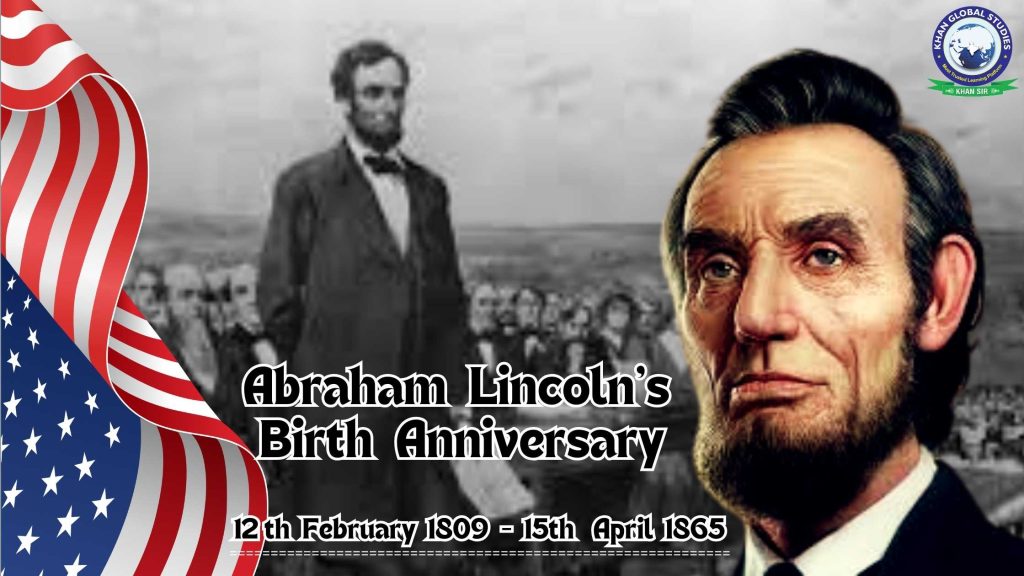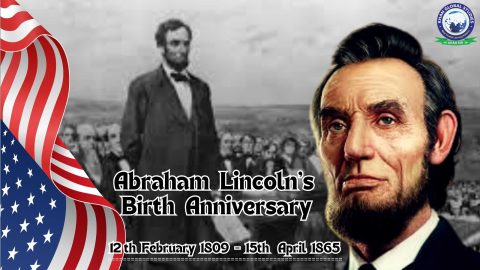Every year on February 12, the birthday of Abraham Lincoln, the 16th President of the United States, is celebrated. He was not only one of America’s most influential leaders but also a visionary whose ideologies and policies inspired the entire world. His honesty, resilience, and dedication to humanity made him one of the greatest figures in history.
Early Life and Struggles
Abraham Lincoln was born on February 12, 1809, in Hardin County (now LaRue County), Kentucky, into a poor family. His parents were Thomas Lincoln and Nancy Hanks Lincoln. Lincoln’s childhood was filled with hardships. He received very little formal education, but he gained knowledge through self-study. His early life was full of struggles, yet his self-reliance and passion for learning inspired him to move forward.
Political Career and Presidency
Lincoln began his political career as a lawyer and gradually entered politics. In 1834, he became a member of the Illinois State Legislature and was later elected to the U.S. Congress.
In 1858, during his election campaign against Stephen Douglas, his speeches gained national recognition. In 1860, he was elected as the President of the United States. After becoming President, he struggled to keep the country united and worked tirelessly to abolish slavery.
Civil War and Leadership as President
As a moderate Republican, Lincoln had to balance multiple political factions during the war. His supporters included the War Democrats and Radical Republicans, who demanded strict action against the Southern rebels. He maintained political stability through effective strategies, administrative decisions, and direct communication with the public.
One of his most famous speeches, the Gettysburg Address, remains a historic declaration emphasizing democracy and national unity. He closely oversaw war strategies, appointed generals, and imposed a naval blockade to disrupt the Southern states’ trade. He suspended habeas corpus in Maryland and other areas and successfully diffused the Trent Affair to avoid war with Britain.
In 1863, Lincoln issued the Emancipation Proclamation, which declared enslaved people in rebellious states free. He directed the Army and Navy to uphold this freedom and enlist them in military service. Additionally, he played a crucial role in passing the Thirteenth Amendment, which completely abolished slavery in the United States.
Civil War and the Abolition of Slavery
After Abraham Lincoln became President, the American Civil War broke out. This war was fought between the Northern and Southern states, with the primary issue being slavery. In 1863, Lincoln issued the Emancipation Proclamation, which legally ended slavery in the United States. This decision gave America a new direction and granted freedom to millions of enslaved people.
Gettysburg Address: A New Definition of Democracy
In 1863, after the Battle of Gettysburg, Lincoln delivered his famous Gettysburg Address. In this speech, he redefined democracy as “government of the people, by the people, for the people.” This speech remains a powerful representation of the true spirit of democracy.
Assassination and Legacy
In 1864, Lincoln was successfully re-elected and worked toward reuniting the nation after the war. On April 9, 1865, the Civil War ended with the surrender of Robert E. Lee. However, just five days later, on April 14, Lincoln was shot by Confederate supporter John Wilkes Booth at Ford’s Theatre. He passed away the next day, on April 15.
Conclusion
Abraham Lincoln was not just a President; he was an ideology. His struggles, honesty, and great decisions set him apart as a remarkable leader. Even today, he remains a source of inspiration, teaching us that despite hardships, staying true to the path of truth and justice is the key to real success.





